|
|
|
Sort Order |
|
|
|
Items / Page
|
|
|
|
|
|
|
| Srl | Item |
| 1 |
ID:
117056
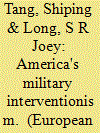

|
|
|
|
|
| Publication |
2012.
|
| Summary/Abstract |
By synthesizing material forces with ideational forces more organically via a social evolutionary approach, we advance a deeper understanding about post-World War II American military interventionism. We argue that post-World War II American military interventionism - that is, the American elites' and public's support for America's military intervention abroad - cannot be understood with ideational or psychological forces alone. Rather, two crucial material variables, namely, geography and aggregate power amplified by superior technological prowess, are indispensable for understanding the propensity for the United States to intervene militarily abroad. These two factors have powerfully shielded the American elites and public from the horrendous devastation of war. As a result, compared to their counterparts in other major states, American citizens and elites have tended to be less repelled by the prospect of war. The outcome is that since World War II the United States has been far more active in military intervention overseas than other major states.
|
|
|
|
|
|
|
|
|
|
|
|
|
|
|
|
| 2 |
ID:
154920
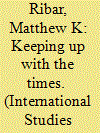

|
|
|
|
|
| Summary/Abstract |
This article examines how the discipline of international relations (IR) engages with the policy process by investigating the discipline’s responsiveness to world events. To this end, the article deploys a mixed-methods approach using historical data of journal articles in twelve top IR journals covering 1980 to 2012 from the Teaching, Research, and International Policy (TRIP) Project as well as a series of interviews with scholars to show how four major world events, or benchmark events, influence the discipline of international relations. The paper finds that benchmark events do cause a shift in the subject areas in which IR scholars publish, as well as a shift in the popularity of theoretical approaches in which scholars ground their research. Benchmark events do not, however, cause a significant shift in where in the world IR scholars study. A series of elite interviews with IR professors is used to elaborate a causal mechanism for these correlations.
|
|
|
|
|
|
|
|
|
|
|
|
|
|
|
|
| 3 |
ID:
156227
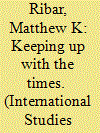

|
|
|
|
|
| Summary/Abstract |
This article examines how the discipline of international relations (IR) engages with the policy process by investigating the discipline’s responsiveness to world events. To this end, the article deploys a mixed-methods approach using historical data of journal articles in twelve top IR journals covering 1980 to 2012 from the Teaching, Research, and International Policy (TRIP) Project as well as a series of interviews with scholars to show how four major world events, or benchmark events, influence the discipline of international relations. The paper finds that benchmark events do cause a shift in the subject areas in which IR scholars publish, as well as a shift in the popularity of theoretical approaches in which scholars ground their research. Benchmark events do not, however, cause a significant shift in where in the world IR scholars study. A series of elite interviews with IR professors is used to elaborate a causal mechanism for these correlations.
|
|
|
|
|
|
|
|
|
|
|
|
|
|
|
|
| 4 |
ID:
060823
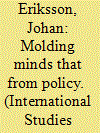

|
|
|
| 5 |
ID:
130925
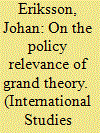

|
|
|
|
|
| Publication |
2014.
|
| Summary/Abstract |
This paper challenges the commonly held perception that grand theory is irrelevant for policy. Policy, it is often argued, is in need of detailed case-oriented empirical analysis and instrumental policy recommendations rather than any sweeping generalizations or lofty ideas emanating from grand theory. Notwithstanding, this paper argues that grand theory has an underestimated relevance for policy. To be able to see and appreciate this, the notion of policy relevance must be expanded. Whereas grand theory and grand concepts such as Realism, Liberalism, Constructivism, or Marxism do not provide case-specific knowledge or recommendations, they provide general roadmaps, conceptualization of world affairs, and also have a symbolic function, legitimating or challenging established policy paradigms. Policymakers, akin to grand theorists, arguably like to make sweeping statements and generalizations. Drawing on theory and findings in public policy studies, here applied to international relations and foreign policy, this paper suggests conditions under which grand theory can be relevant for policy.
|
|
|
|
|
|
|
|
|
|
|
|
|
|
|
|
| 6 |
ID:
087450
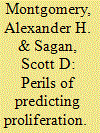

|
|
|
|
|
| Publication |
2009.
|
| Summary/Abstract |
Studies of nuclear proliferation share five serious problems. First, nuclear programs' initiation and completion dates are ambiguous and difficult to code, but findings are rarely subjected to sufficient robustness tests using alternative codings. Second, independent variables overlook important factors such as prestige and bureaucratic power and often use poor proxies for concepts such as the nonproliferation regime. Third, methodologies and data sets should be tightly coupled to empirical questions but are instead often chosen for convenience. Fourth, some findings provide insights already known or believed to be true. Fifth, findings can ignore or gloss over data crucial for policy making and wider debates. This article reviews new quantitative research on nuclear proliferation, noting improved analysis and lingering problems. It highlights the 1999 Kargil war to explore dangers of relying on stock data sets and the need for research on statistical outliers. It concludes with a future research agenda aimed at correcting problems and a cautionary note regarding hasty application of quantitative results to policy making.
|
|
|
|
|
|
|
|
|
|
|
|
|
|
|
|
| 7 |
ID:
153314
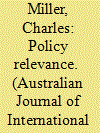

|
|
|
|
|
| Summary/Abstract |
The academic international relations community has come under fire, both in Australia and overseas, for its supposed irrelevance to real-world issues. Recommendations have been made for ‘bridging’ this ‘gap’ between the scholarly and policy worlds. This article takes a sceptical look at some of these recommendations. While this article argues that international affairs academics should be judged on their ability to provide value to society, it also notes that the best way to do so is to capitalise on the academy’s comparative advantages in order to produce high-quality inputs to the public debate. This article expresses concern that some of the recommendations put forward to bridge the gap may, by compromising impartiality, excessively curtailing the time frames for good research, and neglecting theoretical and methodological rigour, run the risk of reducing academia’s value to society.
|
|
|
|
|
|
|
|
|
|
|
|
|
|
|
|
| 8 |
ID:
148450
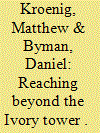

|
|
|
|
|
| Summary/Abstract |
Many scholars are drawn to political science research with hopes that their ideas will influence important policy debates. Unfortunately, scholars who want to shape policy often do not design research appropriately or take advantage of available conditions and opportunities to advance their ideas. This article identifies the conditions under which ideas of academics—and nongovernment knowledge in general—are more likely to be considered by and influence those in the policy world. To reach beyond the ivory tower, we argue that scholars should design research that might produce actionable findings and recommendations, identify moments of ripeness in policy debates, and inject their ideas into the policy process. For those who want to conduct rigorous academic scholarship and influence real-world debates, we provide the strongest possible encouragement and hope that our advice proves helpful.
|
|
|
|
|
|
|
|
|
|
|
|
|
|
|
|
| 9 |
ID:
076499
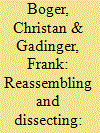

|
|
|
|
|
| Publication |
2007.
|
| Summary/Abstract |
What does it take to be an international relations (IR) scholar? IR discourses have tackled this question with focus on very different problems: the role and function of IR scholars for policy; the (ir)relevance and impact of IR knowledge and expertise in world politics; disciplinary history; or in studying IR's institutions. We argue that all these "disciplinary sociology" debates struggle with the relation between an internal scientific IR world and an external social context (policy, society). We reject this distinction and argue that science studies can help us to address these problems more adequately by treating IR as a scientific practice that is closely tied to its social environment. The article sets out to explore science studies' possible contributions. Based on science studies key assumptions, we develop a heuristic by which the relations between IR and its environment can be grasped systematically. From this perspective, IR is pivotally a culture constituted by different domains of practice. Hence, understanding IR scholars in "doing IR" requires taking into account their daily and sometimes trivial practices. For instance, writing an article in IR means much more than only thinking theoretically at a desk. We systematize the different domains of practices as the articulation of knowledge claims, mobilizing the world, autonomy seeking, alliance building, and public representation. "Being an IR scholar" and "producing IR knowledge" depends inevitably on these sets of practices and IR is intrinsically interwoven with its environment through these.
|
|
|
|
|
|
|
|
|
|
|
|
|
|
|
|
| 10 |
ID:
110827
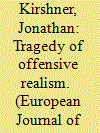

|
|
|
|
|
| Publication |
2012.
|
| Summary/Abstract |
What is the realist position on how to deal with the rise of China? One prominent realist approach, associated with John Mearsheimer, calls for the US to do whatever it can to slow China's rise. However, while this is a realist perspective, it is not the realist perspective. In particular, realist approaches that derive from a classical foundation suggest policies fundamentally different from those favored by Mearsheimer. This article argues that realism should return to some of its classical traditions. It reviews why, from a classical realist perspective, the rise of China must be viewed with alarm, but argues that Mearsheimer's approach - offensive realism - is wrong, and dangerous. Many of these errors are rooted in structuralism; a classical realist approach, which allows for the influence of history and politics, provides greater analytical purchase and wiser policy prescriptions than offensive realism.
|
|
|
|
|
|
|
|
|
|
|
|
|
|
|
|
| 11 |
ID:
141969
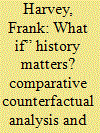

|
|
|
|
|
| Summary/Abstract |
Developing strong, policy-relevant causal explanations for major events in world politics often requires identification and rejection of weak counterfactual claims. Poorly constructed counterfactual arguments reveal serious deficiencies that undercut the necessary condition theories from which they are derived. Stronger explanations of historical events emerge when these weaknesses are weighed against the strengths of competing counterfactuals. Comparing the relative plausibility of competing (weak versus strong) counterfactual claims about the same event is the essence of comparative counterfactual analysis (CCA). When combined with process tracing, CCA can help to generate policy relevant findings by resolving many of the methodological pitfalls researchers confront when each method is applied in isolation.
|
|
|
|
|
|
|
|
|
|
|
|
|
|
|
|
|
|
|
|
|